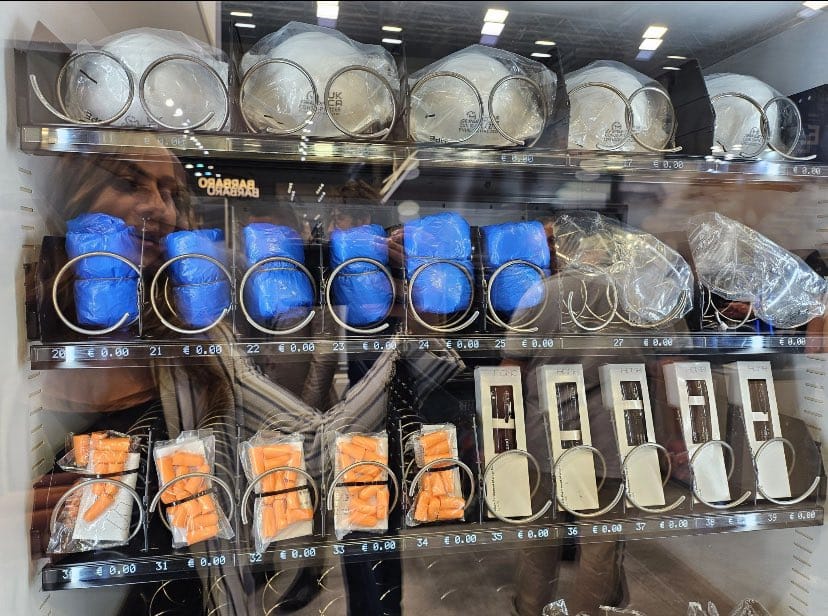Interview: Mario Jakus on Growing Vendaio in the Balkans and Fighting Shrinkage

I had the pleasure of interviewing Mario Jakus, the CEO of Vendaio (Vendaio), a company specializing in intelligent industrial vending machines that track and manage the usage of consumables in factories, workshops, and commercial facilities. Drawing from my experience in fabrication shops and research laboratories, I see these machines as a valuable solution for small factory owners looking to minimize shrinkage—whether through theft or overuse—of essential items like cutting wheels, wire brushes, adhesives, penetrants, and lubricants.
In our interactions I found him to be a strong believer in Balkan economic progress and cooperation. He also advocates for fair treatment of workers - which he believes will result in less youth emigration from Croatia and more young workers returning to Croatia. Enjoy and please remember to subscribe.
What is Vendaio's current top product, and how many factories are using your machines?
Our flagship products are smart industrial vending machines that combine real-time data analytics and AI. This innovative combination allows our customers to achieve approximately 30% savings on their consumable spending by optimizing usage and reducing waste.
How many countries are the machines utilized in?
Our machines are operational in most EU countries. Additionally, we are currently in advanced negotiations with several global suppliers of consumables to expand our reach further.
How do Vendaio’s AI-driven vending machines improve factories and industrial operations?
Vendaio’s machines monitor usage in real-time and implement restrictions on specific products, significantly reducing theft and misuse while ensuring efficient operations.
Can you elaborate on how your AI and data analysis enhance productivity and lower costs for businesses by 30%?
Many factories today lack effective controls to monitor product usage, leading to unnecessary shrinkage. By restricting access to certain items, we help businesses curb losses. For instance, we’ve encountered scenarios where employees from the painting department use welding gloves for personal activities, such as barbecuing. Our AI-driven solutions provide actionable data on actual usage, help eliminate shortages, and ensure that the right personal protective equipment (PPE) or consumables are always available for employees when needed.
What are the main challenges you face as a tech entrepreneur in the Balkans, and what kind of support would you like to see from the government or private investors?
While Croatia shares similar challenges with other countries, the most significant obstacle is the lack of financial support for new entrepreneurs. I would like to see more incubators that connect startups with investors and mentors. We have an abundance of creative talent, but there are limited opportunities to transform ideas into scalable businesses.
How do you see Vendaio contributing to the growth of Croatia’s tech industry and positioning the country as a hub for technology-enabled manufacturing?
While AI is often seen as a buzzword, Vendaio leverages deep data analysis to drive real results. By fostering the development of IT and data sectors, we aim to create high-value jobs in Croatia. Unfortunately, many businesses pride themselves on hiring Croatian talent due to lower costs, without addressing the critical issue of low wages. In today’s interconnected world, why should Croatian professionals earn less for the same work as their counterparts in Germany? At Vendaio, we strive to change this narrative by advocating for competitive salaries and positioning Croatia as a leader in tech-driven manufacturing.
What are Vendaio’s plans for international growth? Are there any specific regions or markets you’re targeting beyond the Balkans?
We are in advanced discussions to open offices in both the UK and the United States. The UK represents a market where we have secured significant contracts, and being closer to our clients will enhance our responsiveness. The USA, a dream market for many, is equally critical for us. As several of our global clients have U.S.-based operations, establishing a presence there will allow us to navigate time zone challenges and offer better support.
You mentioned spending a lot of time communicating with people from Serbia, BiH, and Croatia. How important do you think regional cooperation is for advancing tech startups in the Balkans?
Regional cooperation is essential to unlocking the Balkans' potential. The talent pool across Serbia, BiH, and Croatia is impressive, but local support systems often fall short. We must work collectively to prevent brain drain and foster innovation. A regional think tank could unite our strengths and change global perceptions of the Balkans as a tech hub.
You shared your personal mission with me, including offering higher wages and profit sharing, to retain young talent in Croatia. How do you see these strategies impacting the local job market?
Croatia has everything—vibrant cities, stunning seas, and majestic mountains—except financial stability for its youth. By increasing salaries and introducing profit-sharing models, we can give graduates hope, encourage skill development, and provide clear career advancement opportunities. Profit sharing, although rare here, aligns employees with a company’s financial success, fostering loyalty and long-term growth. It’s a mindset shift that can build a strong economic foundation for Croatia.
Your recent press releases include a partnership with FENTEC and an big upcoming announcement. Can you share more details on these developments and their impact on your business?
Our partnership with FENTEC has gained international recognition, including attention from the U.S. and Asia. FENTEC saw our technology and expertise as complementary to their own, viewing us not as a Croatian company but as a valuable asset. We have even bigger announcements in the pipeline, but for now, they remain under wraps.
Thank you, I will have to do a follow-up when you are ready.
What advice would you give to aspiring tech founders in the Balkans who face skepticism or nationalism-related challenges?
Keep pushing forward. Leverage the diaspora, connect with like-minded individuals, and seek out mentors who have already navigated these challenges. Building a network that looks beyond borders is key to overcoming financial and cultural barriers.
How do you envision the tech landscape evolving in the Balkans over the next decade, and what role do you think Frontier Market Data can play in this evolution?
Today, companies like InfoBip are considered unicorns, but the day will come when such success stories become common. Frontier Market Data is already playing a vital role by highlighting economic and social impacts in the region. Changing perceptions through education and exposure is crucial for positioning the Balkans as a hotspot for groundbreaking innovations.
Mario Jakus can be reached at info@Vendaio.com
Their machines can be purchased at: https://vendaio.com/smart-vending-machines/
For business inquiries: https://vendaio.com/contact-us/




